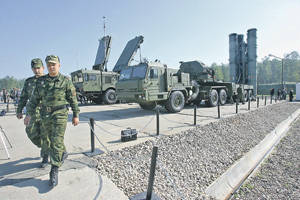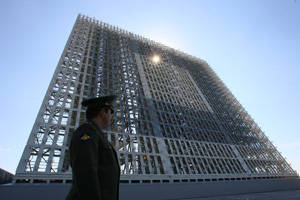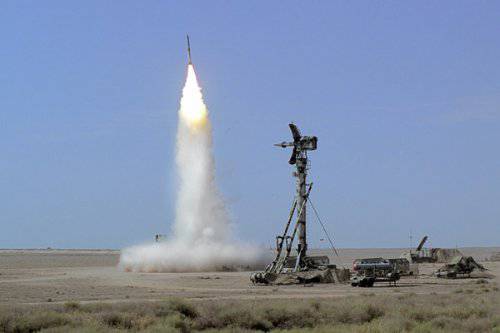Space Protection Holes
 Last week, the Independent Expert Council on the problems of the aerospace defense of Russia gave a press conference in connection with the prolonged absence of any important events or practical solutions in the field of aerospace defense. And her current state was rated as "terrible."
Last week, the Independent Expert Council on the problems of the aerospace defense of Russia gave a press conference in connection with the prolonged absence of any important events or practical solutions in the field of aerospace defense. And her current state was rated as "terrible." Meanwhile, two days later, the commander of the 5-th brigade of aerospace defense, Colonel Edward Sigalov, whose 4,5 thousands of subordinates cover Moscow from the air strikes from the air strikes, spoke on Ekho Moskvy radio on the weekly program “Military Council” . All of them and the combat equipment at their disposal are capable, according to the colonel, of carrying out any task of protecting the Central region from an air enemy and, in the long run, from an attack from space. So the estimates turned out diametrically opposed. Does this mean that one of the two sides distorts the real situation?
We will not rush to a definite answer. The extradepartmental expert council was represented at the press conference by its co-chairman, former commander-in-chief of the Air Force and Air Defense, Army General Anatoly Kornukov, member of the council, ex-chief of armaments of the Russian Armed Forces, Colonel-General Anatoly Sitnov and former head of orders, supply and repair of weapons and military equipment of the Troops Air Defense, Major General Sergei Kolganov.
Of course, they are now retired military leaders, but they were and remain very competent specialists in their field, who are well aware of its current state. If only because they are now advisers to general designers of well-known defense firms. Their direct responsibility is to track all the weak points in the equipment of the army and to ensure that the troops receive more modern military equipment, and manufacturers receive new orders for its development and production.
So the experts put the question squarely: is the Russian EKR capable of repelling the blows of modern means of attack? And, in fact, answered "no", citing a number of evidence in support.
Anatoly Kornukov noted that work on the creation of an aerospace defense system in Russia is proceeding unnecessarily slowly. After the concept of ASD was approved in 2006, little has changed. “The years go by and everything stands still. And to say now that we are ready for something is an exaggeration. We can now confront in terms of air attack the remaining C-300 systems. Well, those remnants of the Su-27 and MiG-29, most of which are without engines and without spare parts. The picture is just awful, ”said the ex-commander in chief. New models of technology are being created, but very slowly. Even slower they go into service. As for the C-300PM anti-aircraft missile systems in service, then, according to Kornukov, “they show themselves well at firing, but it’s impossible to prolong their service life indefinitely ... you need to pull the wires out of the vehicle until it collapses, but she already falls. "
COEFFICIENT OF UNRELIABILITY
But what can the weapons available in the troops still guarantee? Experts say that the assets of the Operational and Strategic Command of the aerospace defense (the former Moscow Air Force and Air Defense District) are able to hit only one of five targets. “If earlier the reliability was 0,96–0,98, now the efficiency (of the systems in service. - OV) is within 0,15–0,20. This refers to how many out of 100 aircraft can pass without impact. Now it’s up to 80, ”said Kornukov. Thus, the effectiveness of the air defense of the Central region of the country has decreased in recent years by almost 5 times. At the same time, the Strategic Command of the East Kazakhstan region in general can hit exclusively air targets. For this there are anti-aircraft systems, detection tools and fighter aviationbut the operational-strategic command has no means of protecting the region from attacks from outer space. “This is ridiculous when the brigade is called the VKO anti-aircraft missile brigade, but it has only the lower part of the aerospace defense - air defense, and there is no“ space ”as such,” the general noted.
Here, as they say, a direct reproach was made to the newly formed military structures that replaced the air defense corps, and serious doubts were expressed in the combat capabilities of the formations designed to protect the sky over the central part of the country. However, the commander of the 5 th brigade of aerospace defense, Colonel Edward Sigalov, issued a completely different assessment in the radio program Ekho Moskvy, which has a zone of responsibility from Kaluga to Sergiev Posad.
“All units and subunits of the 5 Brigade are parts of constant readiness, the timeframe for these units to perform tasks for their intended purpose is reduced from several days to just hours. The units and units on duty are open enough for a short opening time within 10 minutes ... We have been striving for this, and now this is all put into practice, ”said Colonel Sigalov. He also said that “the most modern complexes, both C-300PM and C-400, are in service with the compound. These systems, according to the commander, allow the brigade to hit all air objects that are in the air. And in the future they will give the opportunity to work on goals that are in outer space.
Of course, Sigalov's estimates are quite objective. The colonel told on the open air that he knew thoroughly what he had repeatedly seen at the exercises and for which he was personally responsible as the commander of the formation. He is absolutely confident in the readiness of his subordinates and the military equipment entrusted to them to work in those regimes and for the purposes that were successfully tested "just yesterday." The problem lies in the still unclear prospects for the development of weapons promised to him and to the commanders of other such aerospace defense brigades. In very close and distant perspectives.
AND AGAIN ARE FORCED TO COUNT
 In addition to C-300PM, Colonel Sigalov called the C-400 system “Triumph” - a project that was declared as transitional to systems capable of hitting targets not only in airspace, but also in space. However, in order for this complex to acquire such a quality, it must be equipped with a new rocket. Those that are in service today can shoot objects at a height of no more than 30 km. Two more rockets were created, one of which should fire to an altitude of up to 185 km. She is being tested. True, the deadlines for testing nothing are not visible, and accordingly, no one can yet say for sure when the new missiles will go into service.
In addition to C-300PM, Colonel Sigalov called the C-400 system “Triumph” - a project that was declared as transitional to systems capable of hitting targets not only in airspace, but also in space. However, in order for this complex to acquire such a quality, it must be equipped with a new rocket. Those that are in service today can shoot objects at a height of no more than 30 km. Two more rockets were created, one of which should fire to an altitude of up to 185 km. She is being tested. True, the deadlines for testing nothing are not visible, and accordingly, no one can yet say for sure when the new missiles will go into service. At the same time, the C-400 Triumph complex itself has only two divisions in the Moscow region. During 2010, two more should go there. Next year, 2011 is scheduled to ship four more divisions. And that's it! The 2012 th Defense Ministry did not make orders. And since the complete production cycle of such equipment is 24 of the month, we can already speak about the actual completion of the program for the production of C-400. Of course, more than once it has already been announced that the launch of the C-500 complex with significantly improved performance characteristics will begin. But even according to the most optimistic forecasts, it is expected to complete its development in 2015.
The private advisory council is sounding the alarm: threats from aerospace are today the most dangerous for the military security of Russia! “An air attack from space is now deciding everything, and decides in a very short time,” says ex-commander-in-chief Kornukov. The eventual opponents of Russia are actively developing the means of aerospace attack and defense. “They are preparing, and we are standing still,” the general states. The expert believes that in time for the introduction of new technologies in the field of aerospace defense, our country lags behind the leading military powers on 20 – 30 years.
“We have lost more than 300 supertechnologies in various industries, and primarily in aviation and missile defense. In particular, in the production of a supergraph, which goes to the fairings for missiles, for nuclear units, etc. Everyone is busy with the global development of budget funds, and no one is engaged in the strategic development of new technologies, ”said Colonel-General Anatoly Sitnov. And he noted that to create modern systems that cover space and air and reconnaissance satellites, warnings about rocket attacks and retransmissions require a state-of-the-art element base, new materials, gunpowder and new developments in the field of control systems.
In fact, our country was once a pioneer in the development of combat space systems and means of protection against attacks from near-earth orbits. “But we were told all the time that it is impossible to engage in the militarization of space. We stopped, and America began. We start all the time, and then we have to catch up. This inconsistency, our inconsistency is a fatal factor in business, ”complained Sitnov. - All the experience that we once received, and then lost, today is successfully implemented by the Chinese, Americans and others. And we are again lagging behind. ”
Since 2003, the members of the expert council have tried to explain everywhere that there has been a real technological leap in the development of space attack facilities. At first, many officials of the departments concerned seemed to be skeptical about this. And when the Americans tested the X-37 spacecraft, and X-50 became apparent on their way, everyone suddenly wondered: where did the reusable aerospace system, developed by Lightning, go? ” Mriya "and the orbital ship and the rocket launch system? The fate of missile defense was no better. In the USSR there were two special zones for protection against aerospace strikes - Balkhash, where tests were conducted, and the Moscow Economic Zone. “So what is their state now?” - General Sitnov once again asks an unpleasant question.
And General Kornukov again publicly responded to him: “As for aviation and missiles that fly in airspace, we can handle aviation and the four-hundredth system. As for the operational missiles, I doubt that we can handle it. We do not have the ability and means to combat such missiles. ”
CALL THE RESPONSIBLE PERSON
However, the absence of the necessary missiles is not the only one of the reasons preventing the formation of a full-fledged aerospace defense in Russia. According to Anatoly Sitnov, the second serious (if not the main) cause of the "stagnation" in this kind of defense is the lack of targeted command of the East Kazakhstan region. “There is no one to lead, no one to control the forces and means, to order new air defense systems,” the general specified. He stressed that "it is time to move from words to deeds, create target directorates, target programs for the creation of new systems of aerospace defense".
The colleague was supported by Anatoly Kornukov: “At one time, the entire rocket and space defense was in the same hands — the commander-in-chief of the air defense. He was responsible for air defense, and for the RKO. Now the ideology is inexplicable: everyone dies alone. There is no person who is even responsible for air defense. I think that the right decision would be that everything should be in the same hands, and one person is responsible for the state, preparation, and use of aerospace defense equipment. ” And when the ex-commander-in-chief was asked who exactly should be responsible for the aerospace defense, Kornukov said: “Of course, the Air Force.” He recalled that earlier missile defense weapons were part of the air defense forces, but were later transferred first to the Strategic Missile Forces, and then to the Space Forces.
In turn, the former head of the department of orders, deliveries and repair of weapons and military equipment of the Air Defense Forces, Major General Sergei Kolganov, clarified that today in Russia there is no person responsible for the country's sovereignty in aerospace. He recalled that in the event of an enemy launching the most advanced missiles from submarines, the available time for a strategic decision on our part would be 5 – 10 minutes. How can two or more chiefs agree and make a strategic decision in such a short period of time? There is no effective leadership in the sphere of not only application, but also the development of EKO tools. “Today, personal responsibility for any element of the weapons program has been destroyed. Therefore, not a single weapons program has been implemented in recent decades, ”said Kolganov.
Anatoly Kornukov, co-chairman of the non-departmental expert council, expressed the common position of his colleagues: “We are not hawks and do not want to fight. The aerospace defense system is created as a warning system, protection. VKO is a warning to a potential aggressor that he will be given a proper rebuff. ” But so far in order to make this warning weighty, very much is missing.
- Oleg Vladykin
- http://nvo.ng.ru"rel =" nofollow ">http://nvo.ng.ru

Information